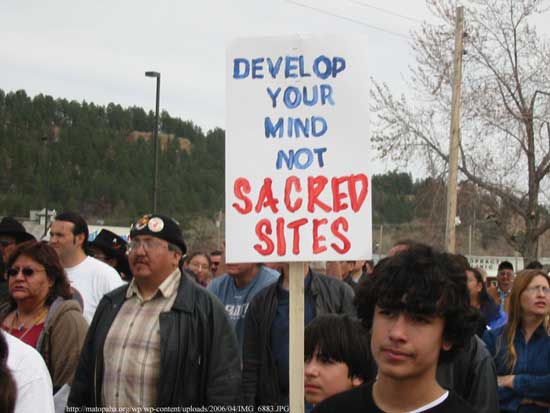 From:
From:C WHITE FACE
To: Harold One Feather
PRESS RELEASE
Nov. 10, 2007
FOR IMMEDIATE RELEASE
ORGANIZATIONS FROM THREE STATES JOIN TOGETHER
ON URANIUM CONCERNS
Nov. 10, 2007
FOR IMMEDIATE RELEASE
ORGANIZATIONS FROM THREE STATES JOIN TOGETHER
ON URANIUM CONCERNS
Organizations from South Dakota, Wyoming, and Colorado met in Rapid City on Saturday, November 10, to discuss their joint concerns about uranium mining in the Region. Citizens from four organizations are voicing their concerns about surface and ground water, human health, and local property values.
Defenders of the Black Hills and ACTion for the Environment are attending from South Dakota, which faces mining proposals along the southern Black Hills. The Powder River Basin Resource Council is attending from Wyoming, where exploratory and mining permits have been applied for in the state. Coloradoans Against Resource Destruction are traveling from the northern part of Colorado where uranium mining is also proposed near Fort Collins.
In all three places, mining is planned by a Canadian company, Powertech Uranium Corporation. The company proposes to use 'in situ' leach mining (ISL) which injects a dissolving solution underground into suspected uranium deposits. The solution dissolves the uranium and its radioactive decay products, as well as heavy metals. This radioactive solution is pumped to the surface. The uranium is then removed and shipped to a mill for concentration into "yellowcake." The water is re-treated and then injected back underground in a cycle that continues until all the uranium has been extracted. Reverse osmosis is then used to remove some of the toxics from the water, and the remaining liquid is either injected underground or retained in shallow ponds.
In Colorado, a Powertech representative said the company also intends to do open pit mining. Other uranium mining companies are currently active in the three states as a result of recent increases in the price of uranium.
"In Wyoming, there are significant questions about regulation and oversight of uranium operations," according to Shannon Anderson, Organizer for the Powder River Basin Resource Council. "Our organization wants the public to have a stronger voice in uranium activities and wants regulators to insure full restoration of mined areas," she said.
In South Dakota, Powertech has started drilling more uranium exploratory wells in an area where they already have 4,000 wells in the southwestern Black Hills. "It's already been proven world-wide that ISL mining contaminates aquifers that cannot be fixed," said Charmaine White Face, Coordinator for Defenders of the Black Hills. "South Dakota relies so heavily on aquifers for drinking water and livestock use that we do not need to add to the destroyed aquifer statistics by doing this kind of mining for uranium here. We've been in a drought for the last ten years and the last thing we need to do is poison our water," she said.
ACTion for the Environment is very concerned that South Dakota taxpayers will once again have to take on the toxic messes that are left when a mining company leaves as happened previously with Canadian companies. "The Board of Minerals and Environment should remember what happened when they gave approval for the Brohm mine. Now SD people are paying for that mess. Are we going to have to pay for a radioactive mess left by another Canadian company?" said Gary Heckenliable, Organizer for ACTion for the Environment. "Not only South Dakota residents but all the taxpayers of the United States are going to have to pay for this for many, many years to come," he said.
Coloradoans Against Resource Destruction (CARD), formed earlier this year in response to Powertech's proposal to mine in the rapidly-growing area near Fort Collins. "Of course uranium mining always causes some form of contamination. Water at in situ leach mining sites is not returned to its original condition," said Lilias Jarding, Ph.D., an Environmental Policy specialist with CARD. "Most people don't know that federal policies that subsidize the nuclear industry aren't just about power plants. The nuclear industry's largest negative impacts have always been in uranium mining and milling processes."
The four groups have issued a common statement:
"We want the uranium industry to know that we stand together on this issue. Whether in a rural setting or a populated area, uranium mining causes radioactive contamination. Past uranium sites continue to contaminate the air, land, and water. Any bonds designed to pay for clean-up of former mining areas have not been sufficient, and taxpayers have been forced to pay the bill. We call on the public and all elected officials to do everything possible to protect the water, land, and local economies from proposed uranium activities."
More information can be found at:
Defenders of the Black Hills:
Coloradoans Against Resource Destruction:
Powder River Basin Resource Council:
Contact:
Charmaine White Face (605) 399-1868
Lilias Jones Jarding, Ph.D. Cell: (970) 412-1924
Shannon Anderson
(307) 672-5809 Cell: (307) 763-1816
(307) 672-5809 Cell: (307) 763-1816

No comments:
Post a Comment